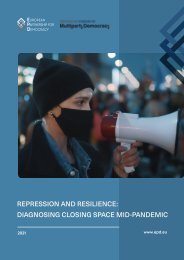Thinking Democratically: A Comprehensive Approach to Countering and Preventing Shrinking Space
You also want an ePaper? Increase the reach of your titles
YUMPU automatically turns print PDFs into web optimized ePapers that Google loves.
the abduction <strong>and</strong> disappearance of journalist Itai Dzamara in 2015 was more than a singular case,<br />
as it sent a strong signal <strong>to</strong> other journalists <strong>and</strong> activists.<br />
While Zimbabwe does not formally suffer from high barriers <strong>to</strong> political participation, in practice only<br />
the ruling party <strong>and</strong> the main opposition party matter in elections. Over 100 political parties<br />
competed in the 2018 elections, with very few participation requirements. However, most of the key<br />
elec<strong>to</strong>ral reforms set out in the new constitution have yet <strong>to</strong> be adopted in a reform of elec<strong>to</strong>ral <strong>and</strong><br />
party law. This is actively countered by the ruling party, who benefit from the old legislative<br />
framework, including for instance the functioning of the Zimbabwe Elec<strong>to</strong>ral Commission <strong>and</strong><br />
elec<strong>to</strong>ral rules. A major determining fac<strong>to</strong>r is the extraordinary level of state capture. The ruling<br />
party abused state resources through the politicisation of food aid, vote buying, millions of euros of<br />
domestic debt, <strong>and</strong> intimidation. This makes the opposition parties – particularly the major opposition<br />
party – heavily reliant on those individuals funding the party. Such an imbalance in resources<br />
contributes <strong>to</strong> an unlevel playing field, <strong>and</strong> the weaker structures <strong>and</strong> capacity of opposition parties.<br />
A more ambiguous tactic for closing democratic space is the undermining of the rule of law.<br />
Interestingly, there are unexpected bouts of independence in the judiciary in Zimbabwe. Specific<br />
judges have at times unexpectedly upheld constitutionalism <strong>and</strong> fundamental freedoms, for instance<br />
in the recent case of the Vice President’s divorce. However, political mingling can lead <strong>to</strong> changes<br />
in judges, which eventually lead <strong>to</strong> partial judgements. Likewise, important cases such as those<br />
related <strong>to</strong> elec<strong>to</strong>ral results end up in the h<strong>and</strong>s of pro-government judges. The ruling party also<br />
actively lengthens procedures in court cases against activists for as long as possible. For instance,<br />
following public protests in January 2019, a large number of civil society <strong>and</strong> opposition activists<br />
were charged with subversion of the government or treason, which carries a sentence of 20 years in<br />
jail. Most of these activists are not convicted, but the lengthy <strong>and</strong> burdensome process is used <strong>to</strong><br />
repress activists <strong>and</strong> instill fear. The military, on the other h<strong>and</strong>, goes unpunished for human rights<br />
abuses in the repression of protests.<br />
6.8 Europe<br />
While in Europe, overall levels of democratic space have been higher than in other regions in the<br />
world, many countries have seen severe regressions in similar ways as witnessed in the case studies<br />
above. This is not only limited <strong>to</strong> younger democracies in Europe, but also older established<br />
democracies like France.<br />
The clearest pronunciations of closing democratic space have been restrictions on civic space <strong>and</strong><br />
pressure on the independence of the judiciary. Restrictions on civil society organisations through<br />
NGO laws <strong>and</strong> the politicised usage of tax provisions <strong>and</strong> administrative regulations have restricted<br />
freedom of assembly. In Germany, this resulted in certain NGOs losing their recognition as an NGO,<br />
<strong>and</strong> in France the state of emergency regarding the terrorist attacks in 2015 was used <strong>to</strong> prohibit<br />
climate protests. Academic freedom <strong>and</strong> media pluralism have been a target in Hungary, while in<br />
58

















